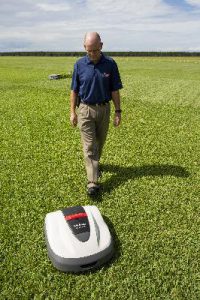With gas prices increasing, there are practical ways to reduce gasoline use in your own backyard.
There are electric, battery, solar powered and robotic (autonomous) lawnmowers. Do you remember the non-motorized reel mower? Or, you could use sheep. But, for the time being, most people have gasoline powered mowers. There are costs involved with mowing, including the cost of gas or diesel fuel.
Be smart as to where you grow grass. Use grass where it serves a purpose. Concentrate your efforts in growing grass where it will grow. It’s normal for lawns to decline in close proximity to large trees. As a lawn gives way to tree competition, do something else in that area. Use mulch under trees or plant shade tolerant plants.
Fertilize smart. Lawns need fertilizer. But, too much fertilizer, particularly too much nitrogen, results in excessive grass growth that requires more mowing.
Many homeowners overdo it with too much nitrogen and too little potassium. Fertilizers with the correct ratios of nitrogen to potassium will produce the right balance of shoot to root growth. Choose a fertilizer such as 15-0-15 or some similar analysis with some slow release nitrogen. Fertilize to produce adequate growth and the correct color. If your lawn is a healthy green and you’re mowing, mowing, mowing… why add more fertilizer?
Centipedegrass and bahiagrass will grow best with fewer problems when fertilized sparingly. This would be one or two light applications of fertilizer per year, or none at all if these grasses are performing well. St. Augustinegrass and zoysiagrass might get by on one spring application; however, it’s more common to apply a second time during summer.
Never apply more than the recommended amount of fertilizer per application. You can always split the total amount into two or more applications, which will produce more even growth and minimize sudden growth spurts.
Though it’s a popular practice, reconsider overseeding your lawn with ryegrass this fall. Weigh the desire to have a green lawn through winter with the extra time and costs (gas, fertilizer, water and pesticides) involved with maintaining it.
Finally, keep your gas-powered lawnmower in good working condition. It can make a difference in how efficiently it operates. Make sure the equipment is clean. Change the oil if needed. Replace or clean the air filter and spark plug. Keep lawnmower blades sharp. Basically, follow the owner’s manual for routine maintenance.
Implementing these ideas can help conserve fuel and result in a healthier lawn.
- Nuisance Gnats abound in Northwest Florida this spring - June 26, 2025
- Watering to Establish a New Lawn - May 15, 2025
- Sweet Onion and Strawberry Success, a Matter of Variety and Timing - April 10, 2025

